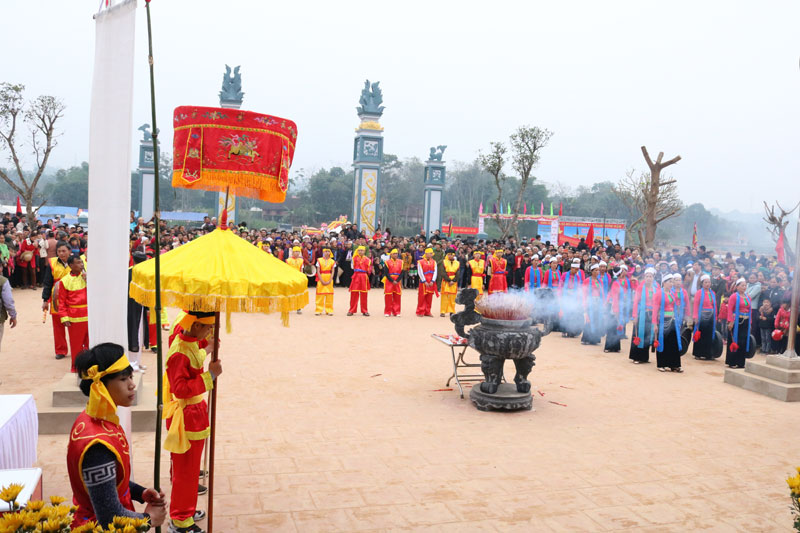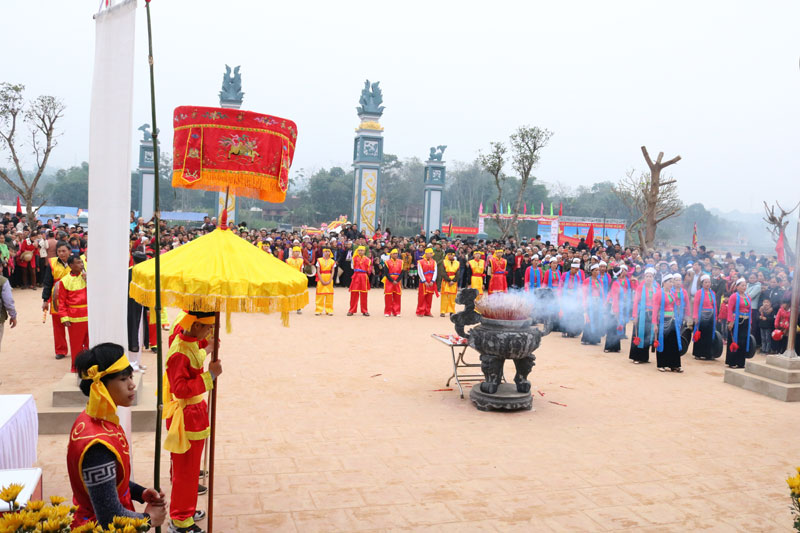
(HBO) – Lac Son district of Hoa Binh province is home to 31 historical – cultural relic sites and scenic landscapes, including three at the national level, 11 at the provincial level, and two others currently seeking the provincial recognition.
 Khoi
Communal House in An Nghia commune, Lac Son district, has been rehabilitated to
serve as a place of worship for local people.
Khoi
Communal House in An Nghia commune, Lac Son district, has been rehabilitated to
serve as a place of worship for local people.
Over the past years, authorities in Lac Son have
paid attention to the management, protection and promotion of local relic
sites’ values. They have increased communications to raise public awareness of
the work. Many localities here have also included relic site protection
regulations in village conventions so that all people can join in common
efforts. Inspection and examination have been enhanced while timely measures
have been taken to deal with any violations of the Law on Cultural Heritage.
The mobilisation, management and use of resources for protecting and upholding
relic sites’ values have been carried out in line with legal regulations.
Apart from recognised relic sites, the
remainders have also been surveyed to be included among those under provincial
agencies’ management. In addition to researching relic sites to make dossiers
seeking provincial and national recognition for them, Lac Son has stepped up
the preservation and rehabilitation of those sites.
Thanks to funding from the State budget and
private sources, some relic sites in the district have been restored with their
original architecture preserved such as the revolutionary relic site of the
Muong Khoi war resistance base (An Nghia commune), Coi Communal House (Vu Binh
commune), the shrine at Trai Cave (Tan Lap commune), and Cay Da Temple (Vu Ban
township).
However, there are still some relic sites at
risk of degradation such as Bang Communal House (Ngoc Lau commune), Khu Dung
Cave (Nhan Nghia commune), and the establishment venue of the provincial Party
Committee’s Office (Nhan Nghia commune).
To bring into play relic sites’ values, aside
from preservation and rehabilitation, the district’s administration has
directed localities to ensure the effective management and organisation of
traditional festivals linked with the sites. Many festivals have been revived,
helping to uphold cultural values and meet people’s spiritual need.
In the coming time, the district will press on
with disseminating the Law on Cultural Heritage and legal documents on the
preservation and promotion of relic sites’ values. It is also set to keep
working to encourage people to join hands in the work./.
With an increasingly vibrant and widespread emulation movement aimed at building cultured residential areas and cultured families, Yen Thuy District has been making steady progress toward improving both the material and spiritual well-being of its people, while fostering a civilized, prosperous, beautiful, and progressive community.
Once lacking recreational spaces and community facilities, Residential Group 2 in Quynh Lam Ward (Hoa Binh City) has recently received attention for the construction of a new, spacious, and fully equipped cultural house. The project followed the model of state support combined with public contributions in both labor and funding.
The "All people unite to build cultural life" movement, which has been effectively integrated with Kim Boi district’s socio-economic development goals, is fostering a lively spirit of emulation across local residential areas, hamlets, villages, public agencies, and enterprises. In addition, through the initiative, traditional cultural values are being preserved and promoted, while community solidarity and mutual support in poverty reduction and economic development are being strengthened.
A working delegation of the Hoa Binh provincial People’s Committee led by its Permanent Vice Chairman Nguyen Van Toan on June 11 inspected the progress of a project to build the Mo Muong Cultural Heritage Conservation Space linked to tourism services in Hop Phong commune, Cao Phong district.
Born and growing in the heroic land of Muong Dong, Dinh Thi Kieu Dung, a resident in Bo town of Kim Boi district, in her childhood was nurtured by the sweet lullabies of her grandmother and mother. These melodies deeply imprinted on her soul, becoming an inseparable part of her love for her ethnic group's culture. For over 20 years, this love for her hometown has driven Dung to research, collect, and pass down the cultural values of the Muong people to future generations.
In the final days of May, the Ethnic Art Troupe of Hoa Binh Province organized performances to serve the people in remote, mountainous, and particularly disadvantaged areas within the province. These were not just ordinary artistic shows, but they were the meaningful journeys aimed at spreading cultural values, enhancing the spiritual life of the people and contributing to the preservation of ethnic minority cultural identities.



 Khoi
Communal House in An Nghia commune, Lac Son district, has been rehabilitated to
serve as a place of worship for local people.
Khoi
Communal House in An Nghia commune, Lac Son district, has been rehabilitated to
serve as a place of worship for local people.